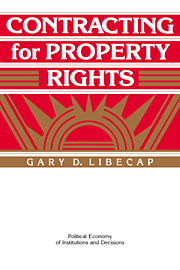Book contents
1 - Contracting for property rights
Published online by Cambridge University Press: 24 March 2010
Summary
INTRODUCTION
Property rights are the social institutions that define or delimit the range of privileges granted to individuals to specific assets, such as parcels of land or water. Private ownership of these assets may involve a variety of rights, including the right to exclude nonowners from access, the right to appropriate the stream of rents from use of and investments in the resource, and the right to sell or otherwise transfer the resource to others. Property rights institutions range from formal arrangements, including constitutional provisions, statutes, and judicial rulings, to informal conventions and customs regarding the allocations and use of property. Such institutions critically affect decision making regarding resource use and, hence, affect economic behavior and performance. By allocating decision-making authority, they also determine who are the economic actors in a system and define the distribution of wealth in a society. Because of their important social role, property rights institutions have been the subject of attention by economists and economic historians, as well as by political scientists and sociologists. Surveys of the economics and economic history literature are provided by Furubotn and Pejovich (1972), North (1978), De Alessi (1980), and Libecap (1986). The focus of this literature largely has been on how various property rights arrangements affect behavior, which ranges from the wasteful practices associated with open-access or common pool settings to the wealth-maximizing actions possible with secure private property rights.
- Type
- Chapter
- Information
- Contracting for Property Rights , pp. 1 - 9Publisher: Cambridge University PressPrint publication year: 1990
- 10
- Cited by



